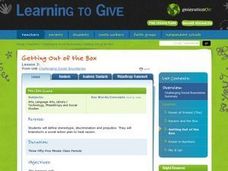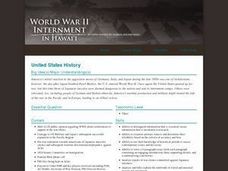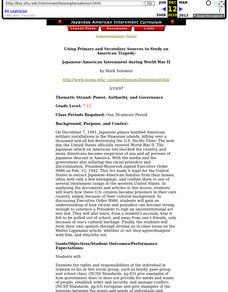Curated OER
Getting Out of the Box
Students define stereotype, discrimination and prejudice. They brainstorm a social action plan to heal racism.
Curated OER
Scapegoating
Middle schoolers examine how stereotypes, prejudices and discriminatory practices lead to individuals and groups being blamed for events. They are introduced to the internment of Japanese Americans during World War II.
Curated OER
Investigating Human Behavior
Students explore the Holocaust and themes such as prejudice and discrimination.
Curated OER
Facts about Indigenous people Jigsaw
Young scholars examine facts which address common myths and misconceptions. They recognize the resulting racism, prejudice and discrimination. Students brainstorm for common myths based on the stereotyping of Indigenous people.
Curated OER
Antisemitism
Eighth graders explore antisemitism and propaganda and stereotypes. They make connections to current-day antisemitism, racism, prejudice and bigotry.
Curated OER
Martin Luther King Jr's Birthday
Students will recognize the problem of prejudice and racism in the history of America especially during the time of Martin Luther King Jr. They will also recognize that feelings can be expressed through the written medium of poetry.
Curated OER
What is Sensitivity?
Students examine the difference between internal and external differences in people. They identify prejudices in society and explain how important it is to be sensistive to others. They discover types of sensitivity in "To Kill A...
Curated OER
World War II: Internment in Hawaii
Students examine world history by writing an essay in class. In this World War II lesson, students identify the attack on Pearl Harbor, the response from the U.S and the effect it had on Japanese-Americans. Students define Japanese...
Curated OER
To the North: A Black Family Leaves Arkansas to Find Work in Michigan
Upper elementary and middle school scholars study the economic factors that caused so many Arkansans to migrate to different parts of the country looking for work. Use this history lesson plan to help your charges gain a better...
National Nanotechnology Infrastructure Network
Help or Hype: The Ethics of Bio-Nanotechnology
Ethical concerns are not always black and white. A well-designed lesson presents learners with scenarios for which ethics may come into question. Scholars learn to consider the different sides of a situation and make an unbiased...
Facing History and Ourselves
Decision-Making: Introduction to the Unit
Make your classroom a supportive and communicative place to be before beginning a unit on the Holocaust. Working together as a class, learners reflect on their previous experiences of classroom discussions before establishing a...
Thalian Association Community Theatre
West Side Story: Teacher Resource Guide
West Side Story is widely known as a modern-day Romeo & Juliet. Learners read a list of characters from the play and list their counterparts from Romeo & Juliet before completing a vocabulary enrichment activity and word...
Curated OER
Human Rights And Refugees: The Right To Asylum
High schoolers read the Universal Declaration of Human Rights, define asylum and identify when people have the right to asylum. They examine specific cases of asylum in recent times and consider some of the difficulties refugees face.
Curated OER
One Survivor Remembers: Anti-Semitism
Students analyze and discuss how propaganda influenced anti-Semitism and it's role in World War II. In this propaganda lesson, students define the terms involved in this assignment. Then they will discuss their reactions to a film and...
Curated OER
Smithsonian Asian Pacific American Lesson: Immigration
Many of your class members will have heard of Executive Order 9066 and the Japanese internment camps of World War II. Some may even recognize the terms “Issei” and “Nisei,” but few will have heard of Enemy Alien Hearing Boards, of the...
Curated OER
Setting the Stage for Service Related Learning Relationships
Students understand the stereotypes and realities of older people. In this philanthropic lesson, students in groups read and report on the positive images of older people in children's books. Students address the needs and wants of older...
Curated OER
Do the Write Thing
Students take stands on issues that matter to them. In this philanthropy lesson, students read Anne Frank: The Diary of a Young Girl, discuss the act of advocating for others, and write letters of support for issues they belive in to...
Curated OER
Japanese-American Internment during World War II
Young scholars write an in-class essay on whether they agree/disagree with Lippmann's article concerning Japanese-American internment
Curated OER
Getting Our Facts Straight! Holocaust Group Research Projects
Students work together in groups to research the Holocaust. Using a rubric, they gather information and develop visual aids. They apply principles of justice, equality and freedom to real-life situations. They present their information...
Curated OER
In the Shadow of Death
Students research the initial labeling and classification of Jews through the use of images on the Web. They gather additional information about the history and effects of the Holocaust on survivors.
Curated OER
"Once Upon a Time": Tearing Down Fences
Ninth graders study how individuals take responsibility in reducing societal misunderstandings. They discover the irony in thinking that building fences provides security and solves societal problems. They consider the fences that every...
Curated OER
You Don't Even Look Aboriginal
Students view and respond to artwork and demonstrate understanding of different viewpoints about identity. Students then collect images of family members and symbols from magazines that represent their home and workplace, and create...
Curated OER
Never To Forget
Tenth graders discuss the events leading up to antisemitic behavior in Europe during World War II. Through various activities, 10th graders acquaint themselves with the political ideology of Nazism and assess responsibility for the...
Facing History and Ourselves
How Do Rules and Traditions Shape Communities?
Sixth graders explore the concepts of laws and customs in a community, examining the reasoning behind rules. Then then collaborate to write their own classroom code of conduct.























